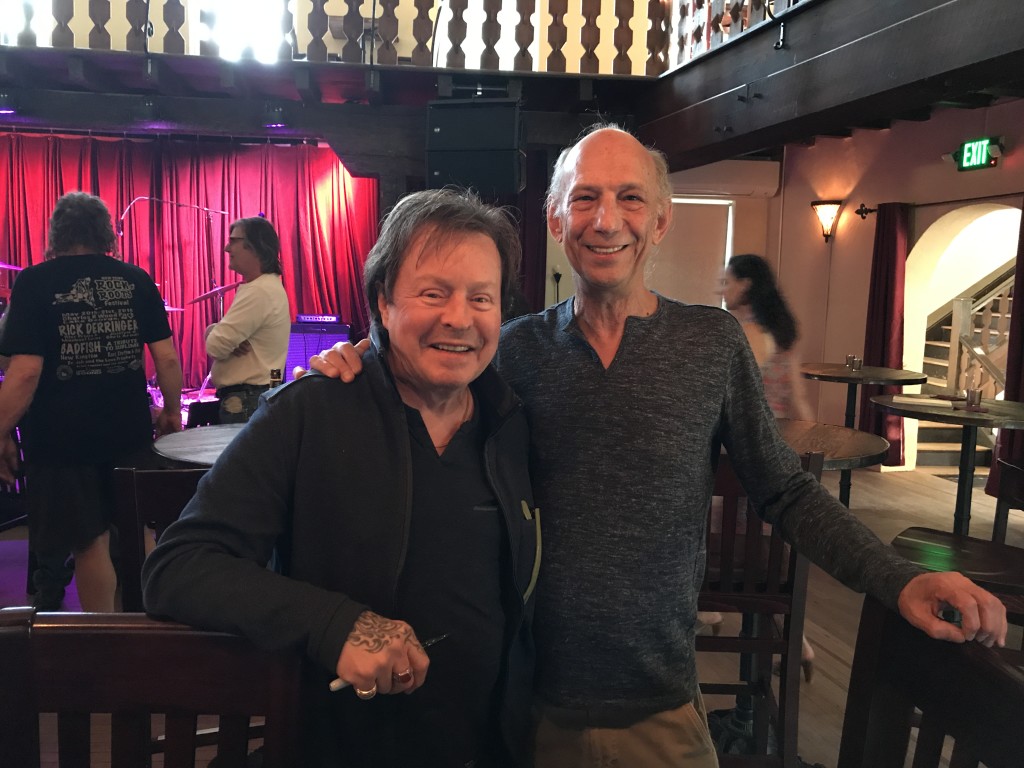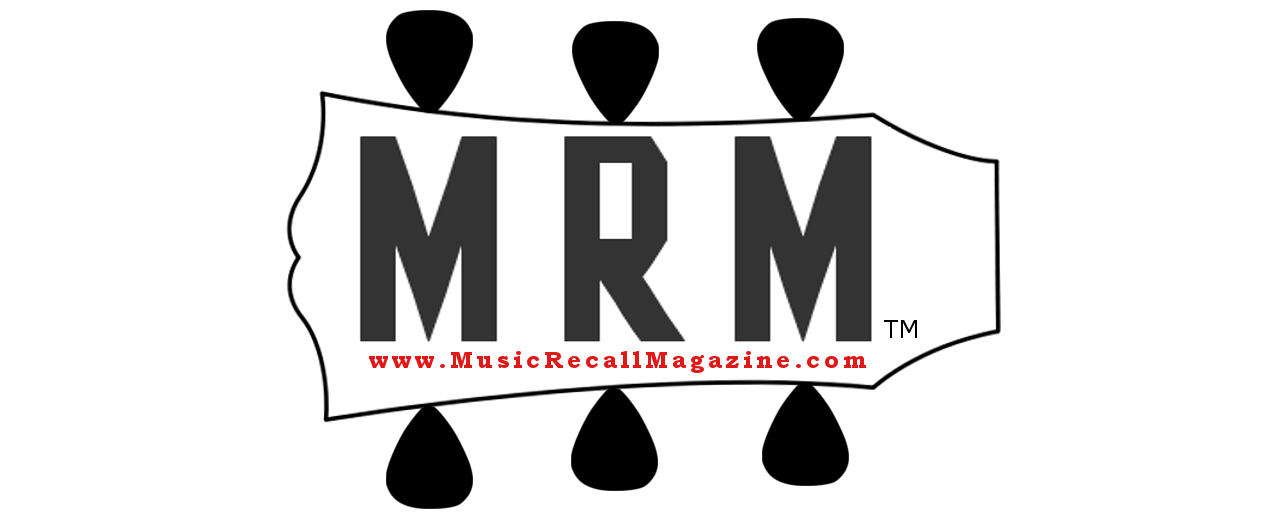
“The Rock Doc” Neil Ratner MD (right) with Rick Derringer.
We recently chatted with Neil Ratner MD aka The Rock Doc about his story filled life in rock and medical fields. His recently released “Rock Doc” autobiography is a must read! Please see links below to purchase.
—–
MRM: How did you get into music and decide to become a drummer? Who were your drum influences?
Ratner: I was born with rhythms running around my brain always banging silverware on the table or playing drums on my knees so it all sort of came naturally. Early on it was Gene Krupa and Buddy Rich but when the British Invasion occurred there were many others.
MRM: Was Rick Derringer the first time you came in contact with a major rocker?
Ratner: I had been to many concerts before meeting Rick and both in high school and college I had bands and was part of the local music scene, but he was the first I personally got to know.
MRM: Even though you weren’t in the bands, was it still fun being out on the road?
Ratner: Fun but a lot of work and responsibility.
MRM: Any wild stories from the road?
Ratner: Here is one from the book:
Kenny Marshall, another friend from the University of Vermont, was pissed off that I had not chosen him to be in Edgar Winter’s road crew. Kenny was about 5′7′′, slightly built and not athletic in any way. Being a roadie was very demanding, and I knew he would never be able to hack it. Kenny was aware of my concerns but let me know that at some point he expected a job.
He came to visit me at Edgar’s house in Clinton Corners, a small town a short distance from NYC, in early August 1971. We had a gig not too far away at Gaelic Park in the Bronx. I didn’t think it would be a big deal to let him drive Edgar and a couple guys in the band. I gave him detailed driving directions (remember, no cell phones or GPS), and I told him to make sure to leave himself plenty of time.
I left early to check out the venue, a medium-sized open-air gig with a good stage and sound system. We were sandwiched between Looking Glass, the opening act, and Ten Years After, the headliner.
The concert was about to begin and no Kenny. Looking Glass had about a twenty-minute set. Howard Stein, the promoter, was not happy.
“If Edgar isn’t here by the time Looking Glass goes off stage, forget about it.”
What could I say? Their set ended, and Howard told my guys to break down Edgar’s stuff. I begged for a little more time.
“Ten minutes!” Howard barked back.
I was trying to remain calm but found myself pacing back and forth behind the stage. The ten minutes sped by, and Howard gave the signal for my roadies to move our equipment off stage. At that moment, Kenny’s car pulled up and came to a screech- ing halt, and, although he had a curfew, Howard let us do a much-shortened set of three songs.
I was livid. Kenny did his best to apologize, but I did not want to hear it. Edgar wouldn’t drive back to Rhinebeck with him. I asked Paul to take them back. Kenny loaded out with Ashley and some crew from Gaelic Park. Then, unbeknownst to me, Ashley took off with a girl and told Kenny to drive the twenty-foot rented U-Haul truck with all of the band’s equipment back to the hotel at LaGuardia Airport, where the crew was staying. Kenny had never driven any type of truck before, but for some reason, decided to do it anyway.
I went back to the house. My anger had subsided. I wasn’t quite ready to forgive him, but I had to have some pity on him, especially when he told me what happened in the car. After having gotten lost once, nobody trusted him, arguments ensued, and they kept going around in circles until Kenny took control again and got them to the gig.
About four hours later, he called. I could hear from his voice that something was wrong. After what he described as an unbe- lievably harrowing drive, he arrived at the Holiday Inn, where the front entrance included a low concrete overhang. The truck was higher than the concrete, and as Kenny drove, he proceeded to peel back the top of the truck as if it were the lid of a sardine can. He was able to back out, but the truck and the concrete aw- ning were badly damaged.
Nobody was injured, and the equipment was intact. I told Kenny to go home and never to call me again. Luckily, insurance covered the damage. It was a few years before we spoke, but we reminisce and laugh about it today.
MRM: How did you start your tour production company? What became of it?
Ratner: After coming up with the idea I went to Peter Watts a good friend and in charge of sound for the Pink Floyd. He knew the right tech people for me to partner with and we were off and running. In the end, I sold the company to my partner.
MRM: Were you suffering from uric acid or calcium type of kidney stones when you had that epiphany to become a doctor? (I only ask since I’m just getting over uric acid gout myself haha).
Ratner: Probably Calcium but none recovered.
MRM: Why was it so hard to get into a medical school in the US?
Ratner: Always has been due to lack of enough spots and back in the day they didn’t care about well rounded individuals it was all about grades. Also when I applied many Vietnam vets trying to get into professional schools.
MRM: When did you decide you wanted to be an anesthesiologist?
Ratner: During my surgical residency I realized I was better suited for being at the other end of the operating table.
MRM: How did you end up connecting with Michael Jackson?
Ratner: He was a patient at an office of a surgeon I worked with (Chapter 1 of the book).
MRM: How was it being in Michael’s entourage?
Ratner: An interesting sometimes frightening exciting and unusual experience to say the least.
MRM: Would you say getting to meet Nelson Mandela was the best time of your life?
Ratner: Certainly one of the most meaningful.
MRM: Were you the first of Michael’s doctors to administer propofol (milk of amnesia) as a sleep aid?
Ratner: He had had it as an anesthetic for minor procedures but I was first to develop a treatment for him using Propofol but the treatment addressed three things nutritional depletion, dehydration and sleep.
MRM: What did you think of Michael’s death when all of the details finally came out?
Ratner: Sad and angry. Sad that Michael didn’t understand the seriousness of what he was asking and angry that the treatment was corrupted with a lack of concern for the basics of giving people medication.
MRM: Could you tell us about International Community Bakeries?
Ratner: It is a charity created to aid the poorest of the poor by helping them to create self-sustaining micro bakeries in their communities.
MRM: I really enjoy your This Week In Rock segments on WDST Radio Woodstock. Any chance you could get your own show and/or be syndicated?
Ratner: We are working on those and other possibilities including starting a Rock Doc podcast.
MRM: Do you still stay in contact with any rock stars?
Ratner: Not so much I have more contact with industry people from back in the day.
MRM: What can you tell us about your recently released “Rock Doc” autobiography?
Ratner: It’s all of the above plus a lot more with a great color picture section as well.
—–
Link to Neil’s book: https://www.amazon.com/Rock-Doc-Neil-Ratner-MD/dp/1732379017 & https://www.neilratnerrockdoc.com/the-book#.XWATqrj2WSA
Link to Neil’s website: http://www.neilratnerrockdoc.com
Link to Neil’s Facebook page: https://www.facebook.com/neilratnerrockdoc/
